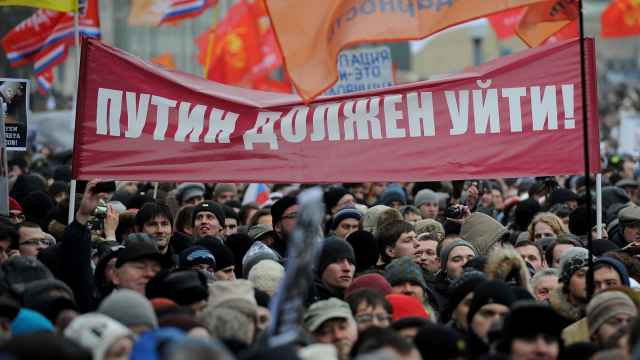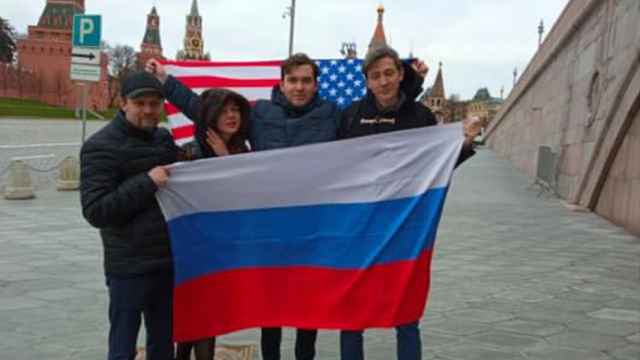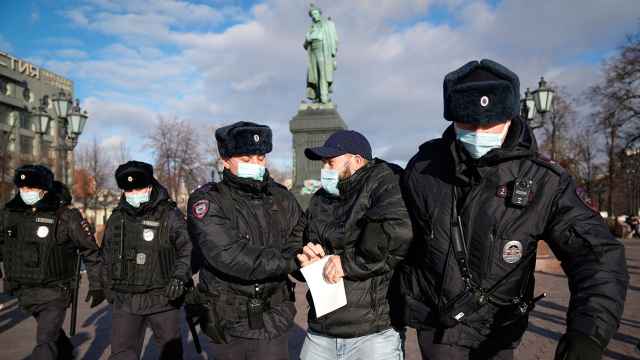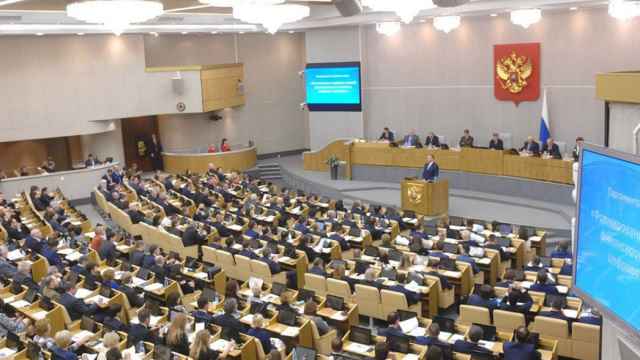In Russia’s staid parliament, the dying days of 2020 were marked by unusually frenzied lawmaking activity, most of it centering on civil rights.
Over the course of a few days in late December, the State Duma passed a flurry of bills introducing sweeping new restrictions on political protests, legalizing censorship of social media and cementing broad new guidelines under which the government can designate individuals as “foreign agents.” They have already been signed into law by President Vladimir Putin.
To many observers of Russia’s political scene, the new legislation — coming on the heels of the August poisoning of opposition activist Alexei Navalny — represents a pronounced hardening of Russia’s authoritarian system ahead of parliamentary elections in the fall.
“The state is waging war on civil society,” said Andrei Kolesnikov, senior fellow in Russian domestic politics and political institutions at the Carnegie Moscow Center. “This is the natural evolution of authoritarianism.”
The laws are a mixed bag, some tightening long-standing screws on opposition activity, while others respond to newer threats.
New restrictions banning public demonstrations near law enforcement premises, defining single-person pickets — the traditional means of avoiding restrictions on mass gatherings — as protests, and prohibiting support of rallies by foreign individuals or organizations are the latest moves in a years-long tightening of laws on mass demonstrations.
Likewise, a law allowing individuals to be categorized as “foreign agents,” a legal term critics see as redolent of Soviet-era purges, comes after several years of the label being applied to organizations ranging from human rights groups to independent pollsters.
Other provisions, including those allowing the state to ban social media networks that censor Russian state media are new. One bill criminalizing the spread of libel online is aimed partly — according to its author, United Russia deputy Dmitry Vyatkin — at popular channels on the messaging app Telegram, which many Russians turn to for news and political gossip.
In particular, a law banning the disclosure of security service employees’ personal data has been linked by the BBC’s Russian Service to a recent Bellingcat investigation that used telephone and flight records to unmask the FSB officers behind the attempt on Alexei Navalny’s life.
More broadly however, the new restrictions are seen by political analysts as the Russian state girding itself for a difficult year in which the pro-Kremlin United Russia bloc will have to defend its supermajority in the State Duma amid a spirited opposition challenge and low approval ratings for the ruling party.
“These laws are a hedge against all possible scenarios,” said Carnegie’s Kolesnikov. “Including those related to the elections.”
In the past, elections — especially those to Russia’s parliament — have been flashpoints for major outbreaks of unrest.
In 2011, allegations that Duma elections had been rigged in favour of United Russia provoked massive rallies in Moscow, and a corresponding wave of legislation clamping down on public protest.
In 2019, disqualification of opposition-minded candidates from elections to the Moscow city council resulted in several weeks of demonstrations in the capital.
Should United Russia — which has sunk in the polls having shouldered the blame for an unpopular 2018 pension reform — resort to overt electoral fraud to maintain its Duma majority, then protests are likely. Tough new legal penalties may provide a way of ensuring they do not spiral out of control.
The events of the past year in Russia and its neighbors may also have focussed minds in the Kremlin.
According to some experts, the legislative crackdown is being driven by events in Belarus, where longtime strongman Alexander Lukashenko’s re-election to a sixth term as president sparked unrest that brought his country to the brink of revolution.
At home, the arrest of the popular, non-United Russia governor of Khabarovsk on historic murder charges sparked massive and unprecedented protests in the Far Eastern city of 600,000.
“The Khabarovsk events changed everything,” said Alexei Makarkin, vice president of the Center for Political Technologies, a Moscow political consultancy.
“They showed that mass protest could happen in the provinces, not just in Moscow. With these new laws, the state is trying to make sure nothing similar happens ahead of the Duma elections.”
The broad applicability of the new laws, many of which hinge on terms like “foreign agent”, which have no established legal definition, leads many observers to believe that prosecutions will be selective, and determined by individual political considerations.
“At first, enforcement will be selective and based on seemingly inexplicable criteria,” said Kolesnikov. “But there’s always a risk of large-scale enforcement.”
Some, however, believe that the flurry of repressive legislation is the prelude to a sweeping crackdown on Russian civil society by a Kremlin that has lost patience with its domestic critics.
According to a recent essay by political analyst Tatiana Stanovaya, the legislative crackdown is part of a “new political regime,” in which state repression traditionally reserved for the radical anti-Kremlin opposition will be used ever more widely, with journalists, civil society and even the occasionally critical, but ultimately loyal opposition parties represented in the Duma coming under suspicion.
Notably, the parliamentary opposition — which rarely opposes flagship government legislation in the Duma — generally voted against the new laws during their passage through the chamber.
“These laws have nothing to do with national security,” said Sergei Ivanov, a deputy for the far-right Liberal Democratic Party.
“Badge of honour”
So far, however, the new laws’ enforcement appears to be more arbitrary than systematic.
On Dec. 28, the Russian Justice Ministry announced the first five individuals to be classified as foreign agents, a designation that forces them to make regular financial disclosures and include the label on any published materials.
The list includes a St. Petersburg feminist performance artist and journalists from the provincial cities of Pskov and Petrozavodsk.
“There’s not really any obvious logic here,” said Makarkin, of the Center for Political Technologies. “It could well just be people the security services have a grudge against.”
Even so, some of Russia’s newly designated foreign agents say they aren’t worried about their newfound status. Speaking to The Moscow Times by phone, Lev Ponomaryov, a 78-year old human rights activist and former Duma deputy said that while he would be appealing the designation in court, it did not overly concern him.
“I am proud of it. Being a ‘foreign agent’ will become a badge of honour for human rights activists,” he said.
A Message from The Moscow Times:
Dear readers,
We are facing unprecedented challenges. Russia's Prosecutor General's Office has designated The Moscow Times as an "undesirable" organization, criminalizing our work and putting our staff at risk of prosecution. This follows our earlier unjust labeling as a "foreign agent."
These actions are direct attempts to silence independent journalism in Russia. The authorities claim our work "discredits the decisions of the Russian leadership." We see things differently: we strive to provide accurate, unbiased reporting on Russia.
We, the journalists of The Moscow Times, refuse to be silenced. But to continue our work, we need your help.
Your support, no matter how small, makes a world of difference. If you can, please support us monthly starting from just $2. It's quick to set up, and every contribution makes a significant impact.
By supporting The Moscow Times, you're defending open, independent journalism in the face of repression. Thank you for standing with us.
Remind me later.







